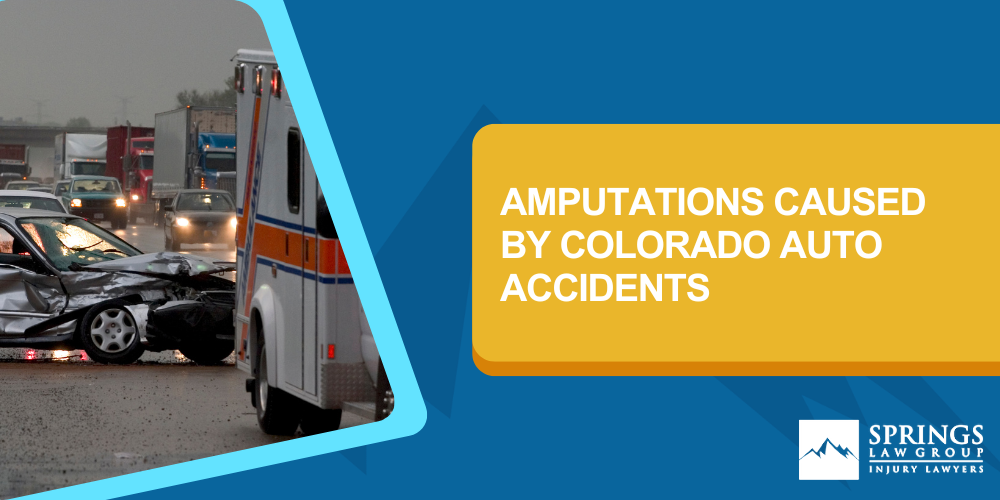Amputations Caused by Colorado Auto Accidents

Serious auto accidents can cause a range of personal injuries. These injuries commonly include broken bones or severe lacerations. More significant crashes will cause more serious injuries such as paralysis or wrongful death. But any of these types of crashes can cause injuries that may compromise a person’s limb. This can result in an amputation of the limb that succumbs to the acute trauma of the injury, or a subsequent infection during the healing process.
The loss of a limb is a traumatic life event and can cause debilitating physical and emotional injuries to a victim. Individuals who have lost a limb in a Colorado auto accident may have rights under Colorado law for their injuries. But each case is unique, and there is a wide-range of factors that may be applicable in determining liability and damages in your case. Call our Colorado Springs auto accident lawyer for a FREE consultation to learn whether you may have rights to compensation by dialing (719) 421-7141.
Types of Colorado Auto Accidents That May Cause Amputations
Even though the loss of a limb is most likely in a high-speed or heavy impact auto accident, even low-speed impacts causing crushing injuries and result in the need to amputate. This is particularly true if the injury is not treated properly or timely. Some common types of auto accidents that may result in injuries necessitating an amputation to save a person’s life include the following:
- Large truck crashes with big rigs, box trucks, or other commercial trucks;
- Motorcycle wrecks;
- Municipal vehicle collisions, like buses, garbage trucks, construction vehicles;
- High speed car crashes;
- Collisions with an SUV, van, or pickup truck;
- Rollover crashes;
- Head-on collisions;
- T-bone crashes; and
- Other types of crashes.
Generally, crashes that impact directly to the side of the driver or passenger seats or cause the walls of the vehicle to come inwards, crush, bunch up, or otherwise twist inwards are most likely to cause injuries that may result in the loss of limb. This is because of 1) the lacerating impact which can shred or damage the extremity, and 2) the pressure, compression, and force upon an extremity. When the victim is trapped in the vehicle, meaning his or her extremity may be stuck in the vehicle, the pressure and force on the extremity for a prolonged period of time may result in the lack of oxygen or hypoxic condition to that limb which may cause it to die or become irreversibly damaged. An amputation is then necessary to save the life of the victim.
Damages in Colorado Auto Accidents Causing Amputations
“Damages” are the compensation, injury, and relief sought by a party in a lawsuit or claim. Damages can take many different forms, and courts in equity have rather wide discretion to award many different forms of damages that the court may deem appropriate.
In any personal injury accident causing an amputation, the most obvious type of damage to which a victim may be entitled is the pain and suffering he or she endured. Amputation injuries are usually the product of particularly devastating and painful injuries. They cause physical and emotional agony to a person. Thus, victims may be entitled to damages for their past pain and suffering (from the accident up to the time of settlement or verdict) and for their future pain and suffering (from the time of settlement or verdict to the individual’s life expectancy). This is a common type of damage in a personal injury case.
But victims may also be entitled to other types of damages. Lost wages from the subject accident and related treatment may be compensable. Lost earnings, or the inability to return to the same job or career that requires the injured individual to take a job paying less money, can also be compensated. Medical bills related to the subject accident, and expected future medical bills, may also be compensated as damages. Medical devices, such as prosthetics and ambulation devices, may also be compensable in an amputation case.
